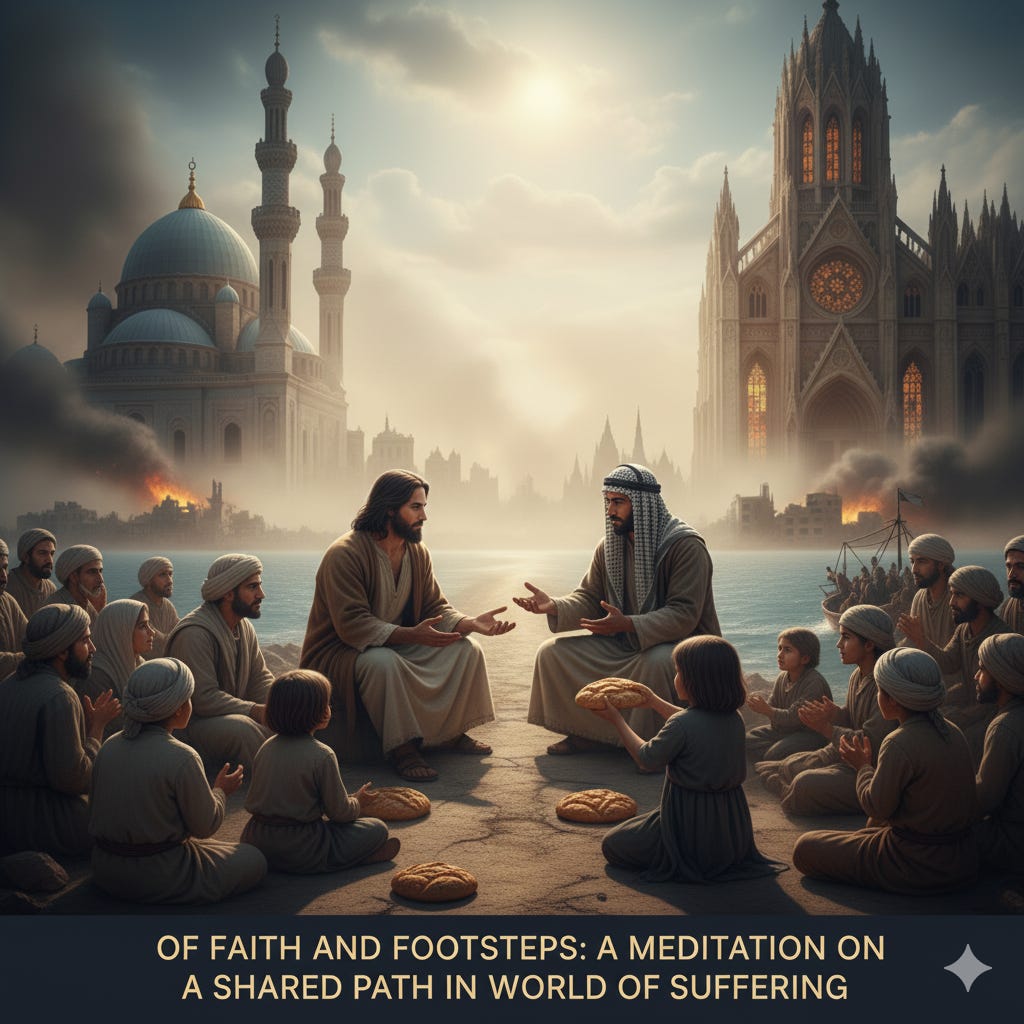Of Faith and Footsteps: A Meditation on a Shared Path in a World of Suffering
Where conviction meets crisis, the true measure of faith is found not in words, but in the path we choose to walk.
In the quiet chambers of our hearts, where we commune with the divine, what is the nature of our belief? Is it a comforting whisper in a gilded sanctuary, a set of rituals that offer solace in a chaotic world? Or is it a fire that drives us out from behind sacred walls and into the dust and clamour of human suffering?
This question echoes through the ages, finding a new and urgent voice in the cries from Gaza. It is a question that challenges us to look beyond the grand pronouncements of our institutions and into the heart of our own convictions, regardless of our tradition.
The Gospels paint a picture of Jesus as a man moved by an immediate and profound compassion. We read of him standing before a hungry crowd, saying,
“I have compassion for these people; they have already been with me three days and have nothing to eat” (Mark 8:2).
He did not offer them distant prayers or send them away empty; he took what little they had—seven loaves and a few small fish—and made it enough. He was not a distant figure; he was present, his hands dirty with the work of compassion, his voice raw from speaking truth to power.
This call to action resonates deeply within Islam as well. The life of the Prophet Muhammad is a testament to a faith rooted in social justice and radical empathy. The Quran is not silent on this matter; it is a resounding command to act. It exhorts believers to
“stand out firmly for justice, as witnesses to God, even as against yourselves, or your parents, or your kin”
(Quran, Surah an-Nisa, Chapter 4, The Women, Verse 135).
True piety is defined by action, by giving
“food in spite of love for it to the needy, the orphan, and the captive”
(Quran, Surah al-Insan, Chapter 76, The Man, Verse 8).
The principle of Zakat, obligatory charity, is not merely a suggestion but a pillar of the faith, a sacred duty to ensure that wealth circulates and that a society’s most vulnerable are protected.
And so, we must ask ourselves: if these prophetic figures were to walk among us today, where would we find them? Would they be seated on thrones, issuing carefully worded statements from behind palace walls? Or would they be on the tilting deck of a ship, sailing toward a blockaded shore, their faces turned toward the hungry and the oppressed?
This is not a question of theology, but of humanity. It is a question that transcends the boundaries of religion and speaks to the core of what it means to be a moral being in an often-immoral world. It is a question that should haunt the comfortable and empower the compassionate.
The true test of faith is not the grandeur of our temples, mosques, or churches, but the depth of our empathy. It is not the eloquence of our prayers, but the sincerity of our actions. It is a choice we make every day, in the face of every injustice: to remain in the safety of our sanctuaries, or to walk the difficult and dusty road, following in the footsteps of prophets who always chose the path of compassion—the path that led to the hungry and the broken. In the end, it is not the pronouncements of our leaders, but the quiet conviction of our own hearts, that will guide our footsteps.


